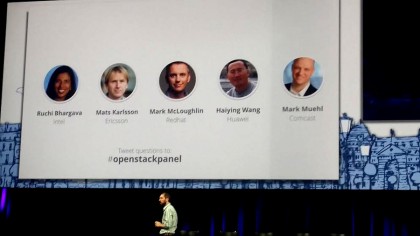OpenStack Foundation working on eliminating downtime from OpenStack upgrade process
Concerns voiced at OpenStack Summit in Paris

Non-profit group the OpenStack Foundation has said that it is working on making it possible for IT departments to upgrade to the latest version of its IaaS cloud platform without suffering downtime.
OpenStack is open source software that organisations can use to create public or private clouds. In a Q&A featuring OpenStack customers at the OpenStack Summit in Paris, executives from companies including Intel and Ericsson highlighted downtime as a particular pain point exasperated by OpenStack's commitment to rolling out bi-annual updates.
Addressing the issue in separate press Q&A that followed, OpenStack COO Mark Collier said that the foundation is "always questioning our assumptions and the model to see if there's some way we can do it better".
He said: "I think one of the key reasons why [the] speed [of updates] is frustrating is because the upgrades are getting harder. As we're making the upgrades easier, working on no downtime and addressing the pain of having to upgrade, you will be potentially want to be upgrading more as it won't be a trade-off between sticking with a current version or getting new features.
"It's about attacking the problem at multiple layers, and I think that the questions are always open on the table. Is [rolling out updates] every six months the right answer, or should we consider a different method? This is why we get together in different cities in the world twice a year. We're different - we're community-led."

OpenStuck
Commenting on issues relating to downtime, Ruchi Bharvaga, head of Intel's IT Cloud Program, said: "Many people are probably still on [OpenStack release] Havana and want to upgrade without bringing downtime to the tenants. And then enterprise shops have lots of investments into infrastructure, so how do we integrate the legacy infrastructure into OpenStack?"
Mats Karlsson, VP Architecture at Ericsson, added: "When talking to a lot of telecoms operators, a lot of them are stuck on Havana because they can't do an upgrade. I think that getting upgrades and automatic backup and restore into place is key. When we start deploying telecom workloads, these are services that require five nines of availability, including planned downtime. We need rolling upgrades to take place but we can't afford to take down systems."
Sign up to the TechRadar Pro newsletter to get all the top news, opinion, features and guidance your business needs to succeed!
Haiying Wang, president of Global Media and Communications at Huawei Technologies, said that a balance was needed between adding functionality to OpenStack while making it easy for users to adopt.
He said: "As OpenStack gets mature, there is lots to do. As it becomes software-defined with functionality moving from hardware to software, it becomes more dynamic but at the same time becomes harder for the user to adopt. The next stage is to provide the tools to update OpenStack for users to click and update themselves and move forward."
